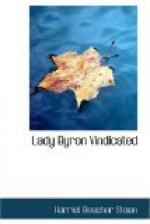The subject, as we have seen, was discussed in ‘The Noctes.’ No doubt appears to be entertained that Byron made the statements to Medwin; and the theory of accounting for them is, that ‘Byron was “bamming” him.’
It seems never to have occurred to any of these credulous gentlemen, who laughed at others for being ‘bammed,’ that Byron might be doing the very same thing by themselves. How many of his so-called packages sent to Lady Byron were real packages, and how many were mystifications? We find, in two places at least in his Memoir, letters to Lady Byron, written and shown to others, which, he says, were never sent by him. He told Lady Blessington that he was in the habit of writing to her constantly. Was this ‘bamming’? Was he ‘bamming,’ also, when he told the world that Lady Byron suddenly deserted him, quite to his surprise, and that he never, to his dying day, could find out why?
Lady Blessington relates, that, in one of his conversations with her, he entertained her by repeating epigrams and lampoons, in which many of his friends were treated with severity. She inquired of him, in case he should die, and such proofs of his friendship come before the public, what would be the feelings of these friends, who had supposed themselves to stand so high in his good graces. She says,—
’"That,” said Byron, “is precisely one of the ideas that most amuses me. I often fancy the rage and humiliation of my quondam friends in hearing the truth, at least from me, for the first time, and when I am beyond the reach of their malice. . . . What grief,” continued Byron, laughing, “could resist the charges of ugliness, dulness, or any of the thousand nameless defects, personal or mental, ’that flesh is heir to,’ when reprisal or recantation was impossible? . . . People are in such daily habits of commenting on the defects of friends, that they are unconscious of the unkindness of it. . . Now, I write down as well as speak my sentiments of those who think they have gulled me; and I only wish, in case I die before them, that I might return to witness the effects my posthumous opinions of them are likely to produce in their minds. What good fun this would be! . . . You don’t seem to value this as you ought,” said Byron with one of his sardonic smiles, seeing I looked, as I really felt, surprised at his avowed insincerity. “I feel the same pleasure in anticipating the rage and mortification of my soi-disant friends at the discovery of my real sentiments of them, that a miser may be supposed to feel while making a will that will disappoint all the expectants that have been toadying him for years. Then how amusing it will be to compare my posthumous with my previously given opinions, the one throwing ridicule on the other!"’
It is asserted, in a note to ‘The Noctes,’ that Byron, besides his Autobiography, prepared a voluminous dictionary of all his friends and acquaintances, in which brief notes of their persons and character were given, with his opinion of them. It was not considered that the publication of this would add to the noble lord’s popularity; and it has never appeared.




